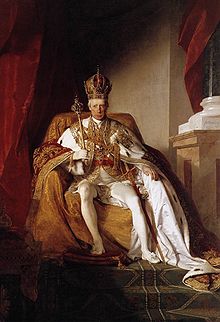- Kaiser
-
For other uses, see Kaiser (disambiguation).
Kaiser is the German title meaning "Emperor", with Kaiserin being the female equivalent, "Empress". Like the Russian Czar it is directly derived from the Latin Emperors' title of Caesar, which in turn is derived from the personal name of a branch of the gens (clan) Julia, to which Gaius Julius Caesar, the forebear of the first imperial family, belonged. Although the British monarchs styled "Emperor of India" were also called "Kaisar-i-Hind" in Hindi and Urdu, this word, although ultimately sharing the same Latin origin, is derived from the Greek Kaisar, not the German Kaiser.[1]
In English, the term the Kaiser is usually reserved for the Emperors of the German Empire, the emperors of the Austrian Empire and those of the Austro-Hungarian Empire. During the First World War, the term the Kaiser — especially as applied to Wilhelm II of Germany — gained considerable pejorative connotations in English-speaking countries.
German history and antecedents of the title
The Holy Roman Emperors (962–1806) called themselves Kaiser,[citation needed] combining the imperial title with that of Roman King (assumed by the designated heir before the imperial coronation); they saw their rule as a continuation of that of the Roman Emperors and used the title derived from the title Caesar to reflect their supposed heritage.[citation needed]
The rulers of the Austro-Hungarian Empire (1804–1918) were born in the Habsburg dynasty, who provided most of Holy Roman Emperors since 1438. The Austrian-Hungarian rulers adopted the title Kaiser. There have only been three Kaisers of the Austrian Empire, the successor empire to the Holy Roman Empire of the German Nation (Heiliges Römisches Reich Deutscher Nation), and they have all belonged to the Habsburg dynasty. The successor empire to the Austrian Empire was termed the Austro-Hungarian Empire, which had only two Kaisers, both again from the Habsburg dynasty.
In 1871, there was much debate about the exact title for the monarch of those German territories (such as free imperial cities, principalities, duchies, and kingdoms) that agreed to unify under the leadership of Prussia, thereby forming the German Empire.[citation needed] Deutscher Kaiser ("German Emperor") was chosen over alternatives such as Kaiser von Deutschland ("Emperor of Germany"), or Kaiser der Deutschen ("Emperor of the Germans"),[citation needed] as the chosen title simply connoted that the new emperor, hearkening from Prussia, was a German, but did not imply that this new emperor had dominion over all German territories.[citation needed] There have only been three Kaisers of the (second) German Empire. All of them belonged to the Hohenzollern dynasty, which, as kings of Prussia, had been de facto leaders of lesser Germany.
In English the (untranslated) word Kaiser is mainly associated with the emperors of the unified German Empire (1871–1918), in particular with Kaiser Wilhelm II, and with the emperors of Austria-Hungary, in particular with Kaiser Franz Joseph I.[citation needed]
The Kaisers of the Austrian Empire (1804–1867) and of the Austro-Hungarian Empire (1867–1918) were:
- Franz I (1804–1835)
- Ferdinand I (1835–1848)
- Franz Joseph I (1848–1916)
- Karl I (1916–1918)
The Kaisers of the German Empire (1871–1918) were:
- Wilhelm I (1871–1888);
- Frederick III (1888), who ruled for 99 days;
- Wilhelm II (1888–1918), during whose reign the monarchy in Germany ended near the end of World War I.
See also
References
- ^ Witzel, M. "Autochthonous Aryans? The Evidence from Old Indian and Iranian Texts", p. 29, 12.1 (as Urdu kaisar).
Categories:- Holy Roman Emperors
- German Empire
- German loanwords
- Heads of state
- History of Germany
- Royal titles
- German noble titles
- Titles of national or ethnic leadership
Wikimedia Foundation. 2010.

